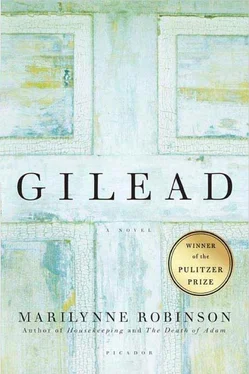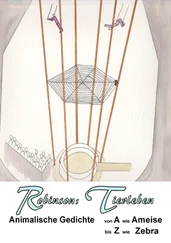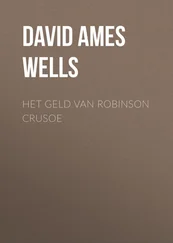So I was predisposed to believe that my grandfather had done something pretty terrible and my father was concealing the evidence and I was in on the secret, too — implicated without knowing what I was implicated in. Well, that’s the human condition, I suppose. I believe I was implicated, and am, and would have been if I had never seen that pistol. It has been my experience that guilt can burst through the smallest breach and cover the landscape, and abide in it in pools and danknesses, just as native as water. I believe my father was trying to cover up for Cain, more or less. The things that happened in Kansas lay behind it all, as I knew at the time.
After that farmer was killed, all the kids I knew were scared to do the milking. They’d do it with the cow between them and the door if the cow would oblige, but they’re particular about that sort of thing and often would not. Little sisters and brothers and dogs would be stationed outside the barn in the dark to watch for strangers. That went on for years, with the story passing down to the younger children, till whoever it was that did the murder would have been an old man. My father had to take over the milking because my brother was in too big a hurry to strip the udder, so the cow stopped giving the way she did before. Then the story went around that someone had been hiding in a henhouse, so all the kids were afraid to gather eggs, and overlooked them or cracked them because they were trying to hurry. Then someone was seen hiding in a woodshed and a root cellar and an attic. It was remarkable what a change came over that place, and how it persisted among the children, especially the younger ones, who didn’t remember the time before the murder and thought all that fear was just natural. Chores really mattered in those days, and if every farm in three or four counties lost a pint of milk and a few eggs every day or two for twenty years, it would have added up. I do not know but what the children may still be hearing some version of that old story, and still be dreading their chores, still draining away the local prosperity.
Every one of us had bolted out of a barn or a woodshed when a shadow moved or there was a thump of some kind, so there were always more stories to tell. I remember once Louisa said we ought to pray for the man’s conversion. Her thought was that it would be better to go to the source of the problem than to keep praying for divine intervention on behalf of each one of us in every situation of possible danger. She said it would also protect people who had never heard of him and would not think to pray before they did their milking. This struck us as wise and parent-like, and we did, indeed, pray for him concertedly, to what effect only the Lord knows. But if you or Tobias happen to hear this story, I can promise you that the villain is probably about one hundred by this time, and no longer a threat to anyone.
I did know a little about the shirts and the gun because of a quarrel my father and grandfather had had. My grandfather, who of course went to church with us, had stood up and walked out about five minutes into my father’s sermon. The text, I remember, was “Consider the lilies, how they grow.” My mother sent me to look for him. I saw him walking down the road and I ran to catch up with him, but he turned that eye on me and said, “Get back where you belong!” So I did.
He appeared at the house after dinner. He walked into the kitchen where my mother and I were clearing things away and cut himself a piece of bread and was about to leave again without a single word to us. But my father came up the porch steps just then and stood in the doorway, watching him. “Reverend,” my grandfather said when he saw him. My father said, “Reverend.”
My mother said, “It’s Sunday. It’s the Lord’s Day. It’s the Sabbath.”
My father said, “We are all well aware of that.” But he didn’t step out of the doorway. So she said to my grandfather, “Sit down and I’ll fix a plate for you. You can’t get by on a piece of bread.”
And he did sit down. So my father came in and sat down across from him. They were silent for some time.
Then my father said, “Did my sermon offend you in some way? Those few words you heard of it?”
The old man shrugged. “Nothing in it to offend. I just wanted to hear some preaching. So I went over to the Negro church.”
After a minute my father asked, “Well, did you hear some preaching?”
My grandfather shrugged. “The text was ‘Love your enemies.’“
“That seems to me to be an excellent text in the circumstances,” my father said. This was just after somebody set that fire behind the church that I mentioned earlier. The old man said, “Very Christian.”
My father said, “You sound disappointed, Reverend.”
My grandfather put his head in his hands. He said, “Reverend, no words could be bitter enough, no day could be long enough. There is just no end to it. Disappointment. I eat and drink it. I wake and sleep it.”
My father’s lips were white. He said, “Well, Reverend, I know you placed great hope in that war. My hopes are in peace, and I am not disappointed. Because peace is its own reward. Peace is its own justification.”
My grandfather said, “And that’s just what kills my heart, Reverend. That the Lord never came to you. That the seraphim never touched a coal to your lips—”
My father stood up from his chair. He said, “I remember when you walked to the pulpit in that shot-up, bloody shirt with that pistol in your belt. And I had a thought as powerful and clear as any revelation. And it was, This has nothing to do with Jesus. Nothing. Nothing. And I was, and I am, as certain of that as anyone could ever be of any so-called vision. I defer to no one in this. Not to you, not to Paul the Apostle, not to John the Divine. Reverend.”
My grandfather said, “So-called vision. The Lord, standing there beside me, had one hundred times the reality for me that you have standing here now!”
After a minute my father said, “No one would doubt that, Reverend.”
And that was when a chasm truly opened. Not long afterward my grandfather was gone. He left a note lying on the kitchen table which said:
No good has come, no evil is ended. That is your peace.
Without vision the people perish. The Lord bless you and keep you.
I still have that note. I saved it in my Bible.
But I would watch my father preaching about Abel’s blood crying out from the ground, and I’d wonder how he could speak about that the way he did. I had so much respect for my father.
I felt certain that he should hide the guilt of his father, and that I should also hide the guilt of mine. I loved him with the strangest, most miserable passion when he stood there preaching about how the Lord hates falsehood and how in the end all our works will be exposed in the naked light of truth.
In course of time I learned that my grandfather was involved pretty deeply in the violence in Kansas before the war.
And as I’ve said, it was a source of contention between the two of them, to the point that they had agreed never to speak of Kansas anymore at all. So I believe my father was disgusted to find that those souvenirs, so to speak, had been left in his house. That was before we went to Kansas to find the old man’s grave. I think that fierce anger against him was one of the things my father felt he truly had to repent of.
But my father did hate war. He nearly died in 1914, from pneumonia, the doctors said, but I have no doubt it was mainly from rage and exasperation. There were big celebrations all over Europe at the start of the war, as if the most wonderful thing were about to happen. And there were big celebrations here when we got involved. Parades and marching bands. And we already knew what a miserable thing it was we were sending our troops off to. I didn’t read a newspaper for four years without pitying my father. He saw that trouble in Kansas, and then his father went off to the army. He did, too, finally, just before it ended. He had four sisters and a brother younger than he was, and his mother wasn’t well. She died young, in her forties, and left all those children to care for themselves and to be cared for by their father and my father and the neighbors and the kindlier souls in his congregation, or what remained of it. His brother, my uncle Edwards, ran off, or so they hoped. At least he disappeared, and in the confusion of the times they never found him. He was named after the theologian Jonathan Edwards, who was much revered in my grandfather’s generation.
Читать дальше












